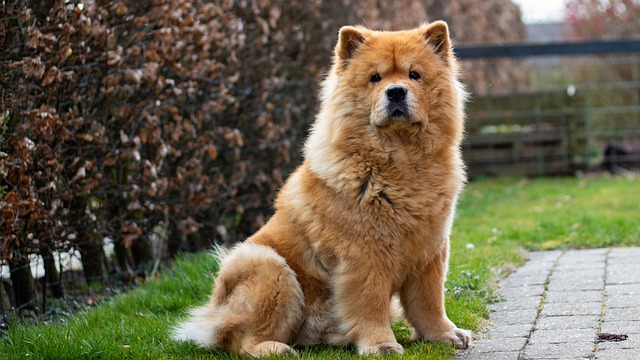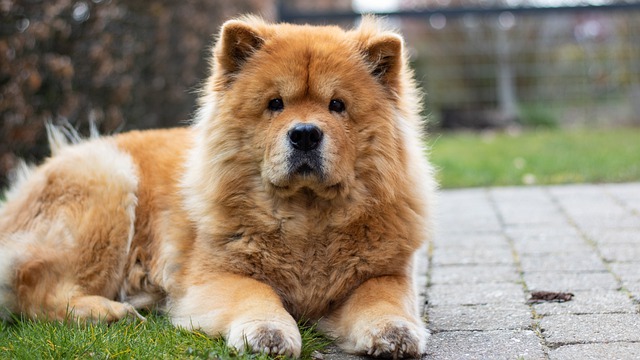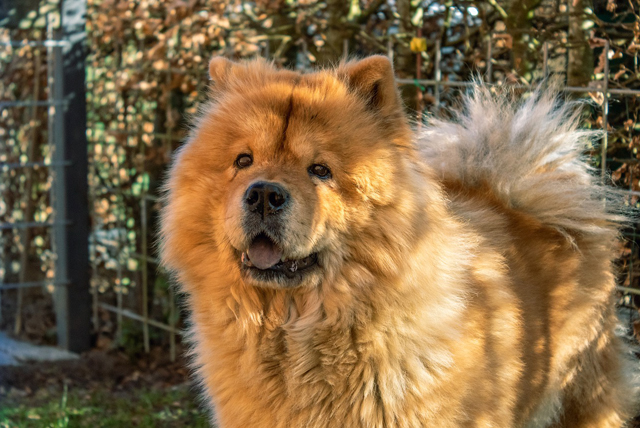iHeartDogs is reader-supported. When you buy via links on our site, we may earn an affiliate commission at no extra cost to you.

Chow Chows look like fluffy teddy bears, but similarly to Pit Bulls and Rottweilers, the breed gets an unfair rap as inherently aggressive. It’s true that Chows are fiercely loyal, having a history as guard dogs and hunters in ancient China. Anyone who has a Chow knows they’re excellent, devoted companions; as we say, “There are no bad dogs, only bad owners.”
Unfortunately, like with most dogs, the Chow Chow breed is predisposed to certain medical conditions. While these health issues can be expensive to treat, you may be able to cover the high costs if you invest in pet insurance for your dog early.
It’s easy to feel overwhelmed when it comes to choosing the right pet insurance plan for your beloved Chow Chow. This guide will help you select a plan that covers everything you want it to, so you can be there for your dog when they need you most.
Compare The Top 9 Pet Insurance Plans for Your Chow Chow Using our Free No-Obligation Quote Tool below
The simplest way to compare pet insurance prices is to use our tool below. The comparison tool will show you quotes from the top 9 pet insurance carriers, including Trupanion, Pets Best, Lemonade, ManyPets, FIGO, HealthyPaws, Prudent Pet, Spot, and Embrace pet insurance.
How Much Does Pet Insurance for a Chow Chow Cost?
Below are some sample pet insurance plans for a 1-year-old male Chow Chow using the zip code 75001 (Texas) as an example.
- Pets Best – $42.27 per month
- Embrace – $57.07 per month
- Healthy Paws – $30.72 per month
- ManyPets – $38.65 per month
Ultimately, your plan’s premium will depend on several factors, including your dog’s age, size, and breed, as well as where you live. You also want to know what type of coverage your plan has and if it will help with Chow Chow-specific health problems. Let’s get more into those medical conditions and how much you can expect to pay to treat them.
Common Health Problems Associated With Chow Chows
Gastric Torsion (aka “bloat”) in Chow Chows
This is the most common health problem associated with large breed dogs like Chow Chows. Gastric Torson (aka “bloat”) occurs when your dog’s stomach fills too rapidly with gas, food, or fluid. Bloat is a sudden, life-threatening condition where the stomach can twist, blocking the organ’s entrance and exit. It can even obstruct blood flow, which is a medical emergency.
Early diagnosis and treatment are essential when it comes to gastric torsion. Preventative measures, like regular exercise, proper diet, and not eating or drinking too quickly help as well.
If you notice any of these warning signs, you should take your Chow Chow to the vet right away:
- Swollen belly
- Rapid heartbeat
- Difficulty breathing
- Collapse
RELATED: Bloat Kills 50% Of Dogs That Get It – Here Is What You Must Know
Glaucoma in Chow Chows
A disease that affects your dog’s eyes, glaucoma is the inadequate drainage of aqueous fluid. This leads to increased pressure in the eyes, which can ultimately cause damage to the optic nerve. Dogs can have either primary (inherited) or secondary glaucoma (caused by disease or injury.) Glaucoma is more common in the Chow Chow breed.
Glaucoma is extremely painful, and the disease progresses quickly, so it’s important to get your dog to the vet as soon as possible to reduce the discomfort and prevent complete blindness.
Look out for these signs and symptoms:
- Watery eyes
- Bulging of the eyeball (the white may turn red)
- Dilated pupils
- Frequent blinking or even vocalizations of pain
Entropion in Chow Chows
Usually an inherited condition, Entropion is another eye-related issue common in the Chow Chow breed. Entropion occurs when the eyelids roll inwards, causing your dog’s eyelashes and facial hair to rub against their cornea. Entropion can lead to corneal ulcerations, scarring, discomfort, and impaired vision if not treated.
Elbow Dysplasia in Chow Chows
The term elbow dysplasia represents several defects relating to the elbow socket. This condition occurs when the three bones making up the elbow joint don’t properly fit together, causing progressive arthritis and pain.
Elbow dysplasia can be difficult to detect initially because some dogs don’t appear to show symptoms. In others, it may manifest as a slight limp or lameness in the limbs.
Stomach Cancer in Chow Chows
Also known as gastric carcinoma, stomach cancer is rare in dogs, but the Chow Chow breed is at a higher risk than most. There are different types of stomach tumors, some of which grow very slowly and others that can grow quickly. Both benign (non-cancerous) and malignant tumors continue to grow if untreated, however, and malignant tumors can spread to other organs. Untreated tumors of a certain size will also interfere with stomach functioning and cause ulcers or gastric obstruction.
The most common symptoms of stomach cancer in dogs include:
- Vomiting
- Loss of appetite
- Diarrhea
- Weight loss
Typical Costs Of Treating Health Issues In Chow Chows and How Pet Insurance Can Help
If left untreated, many of the health conditions listed above can result in long-term consequences and even require surgery, which ultimately makes them more expensive to manage. Selecting a pet insurance plan suited for your Chow Chow’s particular needs might save you tons of money on medical costs.
Here are just some sample veterinary expenses for Chow Chows:
- Gastric Torsion (“Bloat”) Costs: If your dog’s stomach has twisted, it will probably need emergency surgery to untwist it. The average cost of treating a bloat case with surgery runs between $2,000 and $5,000. If there are complications, the cost could be even higher. Pet insurance with emergency coverage can literally be life-saving in this case.
- Glaucoma Costs: Reducing the pressure in your dog’s eyes as early as possible can prevent blindness. Treatment will depend on the level of pressure and the condition of the optic nerve. Medication can reduce pain, but your dog will likely need surgery. The average cost of treatment is $1,500. That cost will climb with follow-up visits and ongoing treatment.
- Entropion Costs: Fortunately, this condition can be permanently corrected with surgery, but it will likely range in cost from $1,100 to $2,000.
- Elbow Dysplasia Costs: Orthopedic surgery to correct the issue is pricey, ranging from $1,500 to $5,000 on average. Depending on the severity of the condition, your dog may not need surgery. Still, treatment for arthritis and other joint issues can be expensive. Your dog will likely require ongoing pain medications (~$20 – $50 per month) and joint supplements. The vet may also prescribe physical therapy, which could cost $50 per session.
- Stomach Cancer Costs: Both treatment options and the outlook depend on the type of tumors present. Diagnosis will be costly, as it will involve several tests, including X-rays, blood tests, and urinalysis. Depending on how advanced the condition is, treatments could involve surgery, chemotherapy, radiation, or a combination. Ultimately, a gastric carcinoma diagnosis plus treatment will cost you thousands and potentially into the tens of thousands. Pet insurance makes a huge difference in situations like this. Sadly, many cases are not caught until the advanced stages, which may mean surgical intervention won’t be possible.
Knowing the signs and symptoms of these conditions common in Chow Chows can help you catch them early, saving your dog and your money. When in doubt, take your pup to the vet to have them diagnosed.
What Is Pet Health Insurance And Why Do I Need It For My Chow Chow?
Pet health insurance works very similarly to human health insurance. Your policy quote will range in monthly price, depending on your dog’s breed, age, and where you live. Typically, you’ll spend around $15-$103 per month as a pet parent.
Pet insurance is mainly about peace of mind, knowing you won’t be totally overwhelmed in case of an emergency. Enrolling even when your dog is young and healthy will ensure you have plenty of coverage when they need expensive medical care later. If you choose a plan more suited to your dog’s particular breed, you’ll be more prepared when something happens later on in their life.

Some plans cover accidents and illnesses, while others only cover accidents. Certain plans do cover breed-specific illnesses, and others do not. It all depends on what type of coverage you choose. With our free pet insurance comparison tool, you can get quotes from multiple insurance companies with no obligation to commit.
Whatever plan you choose, you’ll feel better knowing you can take care of your dog when they need you most. Plus, you won’t have to suddenly shell out thousands of dollars. Learn more about how pet insurance works here.
Pet Insurance Carrier Comparisons
- 9 Best Pet Insurance Plans for Dogs
- Best Cheap Pet Insurance
- Trupanion Vs. Pets Best Pet Insurance
- Trupanion Vs. Lemonade Pet Insurance
- HealthyPaws Vs. Embrace Pet Insurance
- HealthyPaws Vs. Trupanion Pet Insurance
- Embrace Vs. Trupanion Pet Insurance
- Embrace Vs. Lemonade Pet Insurance
- Trupanion Vs. FIGO Pet Insurance
- Prudent Pet Vs. Trupanion Pet Insurance
- Embrace Vs. ManyPets Pet Insurance
- Embrace Vs. FIGO Pet Insurance
- Prudent Pet Vs. Embrace Pet Insurance
- HealthyPaws Vs. ManyPets Pet Insurance
- HealthyPaws Vs. FIGO Pet Insurance
- Prudent Pet Vs. HealthyPaws Pet Insurance
- HealthyPaws Vs. Lemonade Pet Insurance
- Pets Best Vs. ManyPets Pet Insurance
- Pets Best Vs. FIGO Pet Insurance
- Prudent Pet Vs. ManyPets Pet Insurance
- Prudent Pet Vs. Pets Best Pet Insurance
- Embrace Vs. Pets Best Insurance
- HealthyPaws Vs. Pets Best Pet Insurance
- ManyPets Vs. Lemonade Pet Insurance
- Lemonade Vs. FIGO Pet Insurance
- Trupanion Vs. ManyPets Pet Insurance
- ManyPets Vs. FIGO Pet Insurance
- Lemonade Vs. Pets Best Pet Insurance
- Prudent Pet Vs. Lemonade Pet Insurance
- Prudent Pet Vs. FIGO Pet Insurance
Breed Pet Insurance
- Pet insurance for Akitas
- Pet insurance for Alaskan Malamutes
- Pet insurance for American English Coonhounds
- Pet insurance for American Staffordshire Terriers
- Pet insurance for Australian Cattle Dogs
- Pet insurance for Australian Shepherds
- Pet insurance for Basset Hounds
- Pet insurance for Beagles
- Pet insurance for Bernese Mountain Dog
- Pet insurance for Bichon Frises
- Pet insurance for Bloodhounds
- Pet insurance for Border Collies
- Pet insurance for Boston Terriers
- Pet insurance for Boxers
- Pet insurance for Bulldogs
- Pet insurance for Bullmastiffs
- Pet insurance for Bull Terriers
- Pet insurance for Cane Corsos
- Pet insurance for Cavaliers
- Pet insurance for Chesapeake Bay Retrievers
- Pet insurance for Chihuahuas
- Pet insurance for Chinese Crested Dogs
- Pet insurance for Chow Chows
- Pet insurance for Cocker Spaniels
- Pet insurance for Collies
- Pet insurance for Corgis
- Pet insurance for Dachshunds
- Pet insurance for Dobermans
- Pet insurance for Dogue De Bordeaux
- Pet insurance for English Springer Spaniels
- Pet insurance for French Bulldogs
- Pet insurance for German Shepherds
- Pet insurance for German Shorthaired Pointers
- Pet insurance for Goldendoodles
- Pet insurance for Golden Retrievers
- Pet insurance for Greyhounds
- Pet insurance for Great Danes
- Pet insurance for Great Pyrenees
- Pet insurance for Havanese
- Pet insurance for Huskies
- Pet insurance for Jack Russells
- Pet insurance for Labrador Retrievers
- Pet insurance for Labradoodles
- Pet insurance for Lhasa Apsos
- Pet insurance for Maltese
- Pet insurance for Mastiffs
- Pet insurance for Miniature Pinschers
- Pet insurance for Mixed Breeds (small)
- Pet insurance for Mixed Breeds (medium)
- Pet insurance for Mutts
- Pet insurance for Newfoundlands
- Pet insurance for Old English Sheepdogs
- Pet insurance for Papillons
- Pet insurance for Pekingese
- Pet insurance for Pit Bulls
- Pet insurance for Pomeranians
- Pet insurance for Poodles
- Pet insurance for Pugs
- Pet insurance for Rhodesian Ridgebacks
- Pet insurance for Rottweilers
- Pet insurance for Saint Bernards
- Pet insurance for Samoyeds
- Pet insurance for Schnauzers
- Pet insurance for Shar-Peis
- Pet insurance for Shelties
- Pet insurance for Shiba Inus
- Pet insurance for Shih Tzu
- Pet insurance for Staffordshire Bull Terrier
- Pet insurance for Vizslas
- Pet insurance for Weimaraners
- Pet insurance for Westies
- Pet insurance for Whippets
- Pet insurance for Yorkies
Pet Insurance by City
- Pet Insurance in San Diego
- Chicago Pet Insurance
- New York City Pet Insurance
- Pet Insurance in Seattle
- Pet Insurance in Los Angeles
- Pet Insurance in Austin
- Pet Insurance in San Antonio
- Pet Insurance in Miami
- Pet Insurance in Philadelphia
- Pet Insurance in Sacramento
- Pet Insurance in Orlando
- Pet Insurance in San Francisco
- Pet Insurance in Houston
- Pet Insurance in Dallas
- Pet Insurance in Tampa
- Pet Insurance in Pittsburgh
Pet Insurance by State
- Pet Insurance in California
- Pet Insurance in Texas
- Pet Insurance in Florida
- Pet Insurance in Pennsylvania
- Pet Insurance in Washington State
- Best Pet Insurance in Michigan
- State of Delaware Pet Insurance
- Pet Insurance in NC
- Pet Insurance in NJ
- Pet Insurance in Colorado
- Pet Insurance in Ohio
- Pet Insurance in Oregon
- Pet Insurance in Indiana
- Pet Insurance in Oklahoma
- Pet Insurance in Utah
- Pet Insurance in New York
- Pet Insurance in Massachusetts
- Pet Insurance in Arizona
- Pet Insurance in Minnesota
- Pet Insurance in Connecticut
- Pet Insurance in Wisconsin
- Pet Insurance in Hawaii
- Pet Insurance in Iowa
- Pet Insurance in New Hampshire
- Pet Insurance in Alabama
- Pet Insurance in Maine
- Pet Insurance in Maryland
- Pet Insurance in Rhode Island
- Pet Insurance in Arkansas
- Pet Insurance in Illinois
- Pet Insurance in Nebraska
- Pet Insurance in Alaska
- Pet Insurance in Louisiana
- Pet Insurance in South Carolina
- Pet Insurance in Vermont
- Pet Insurance in Georgia

 Toledo, United States.
Toledo, United States.